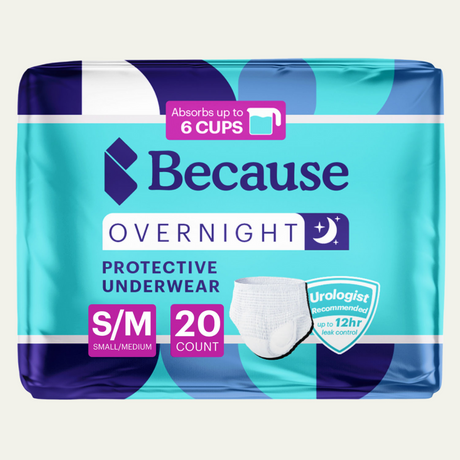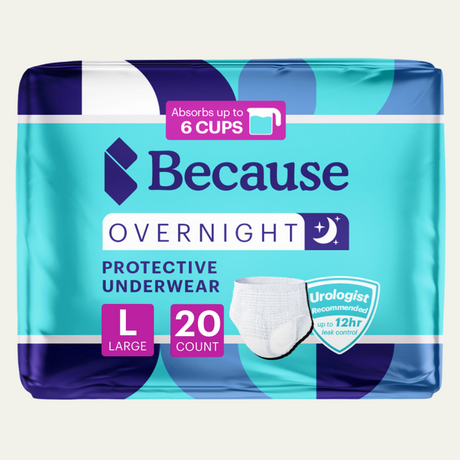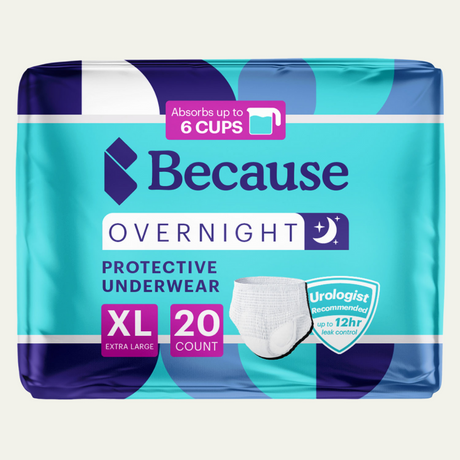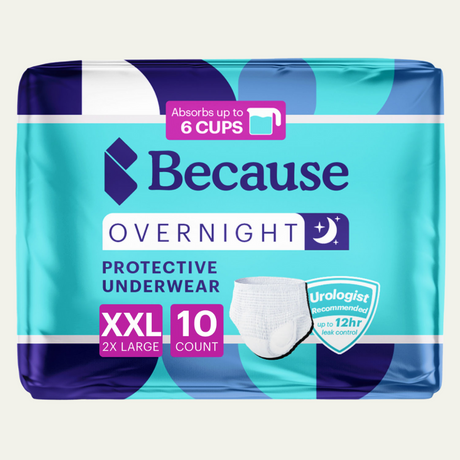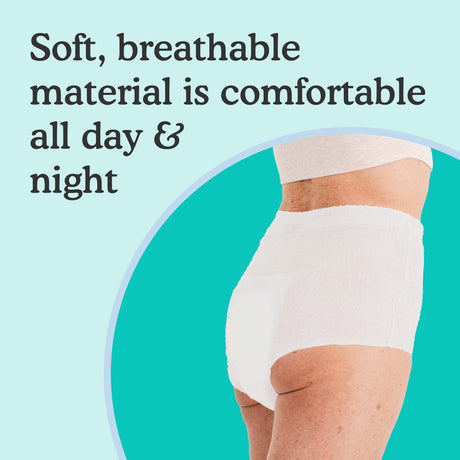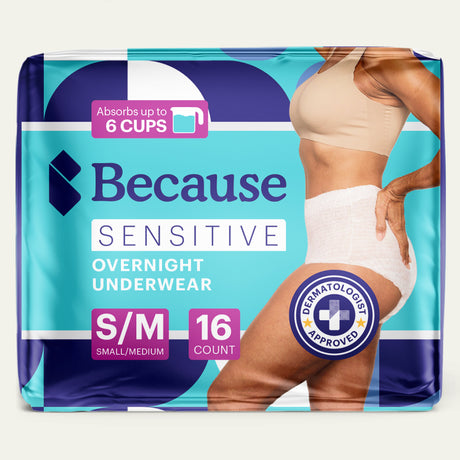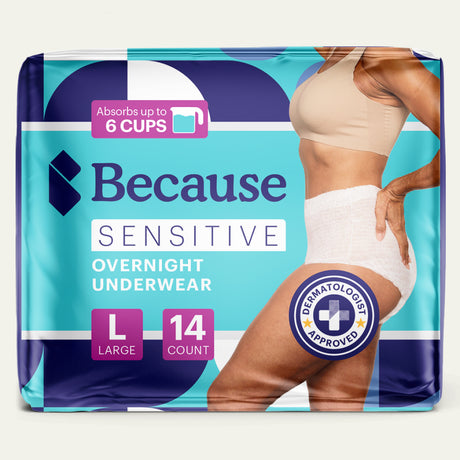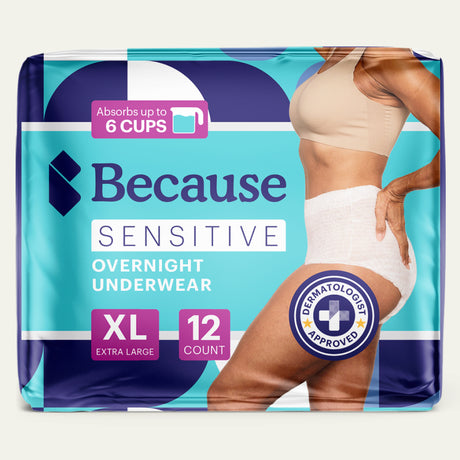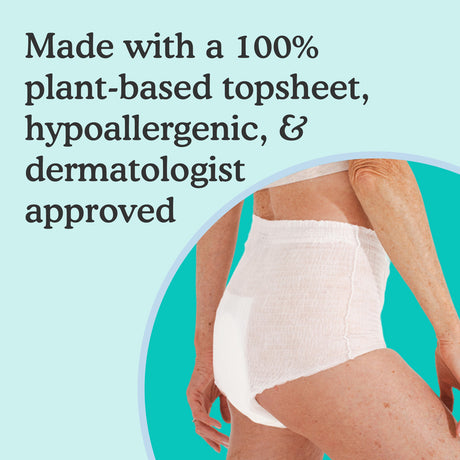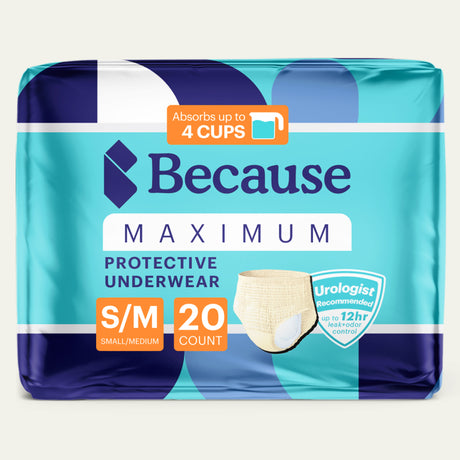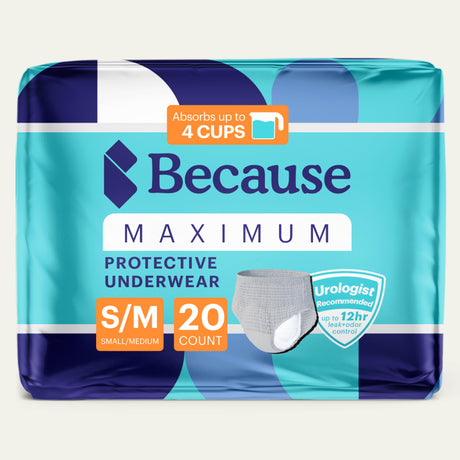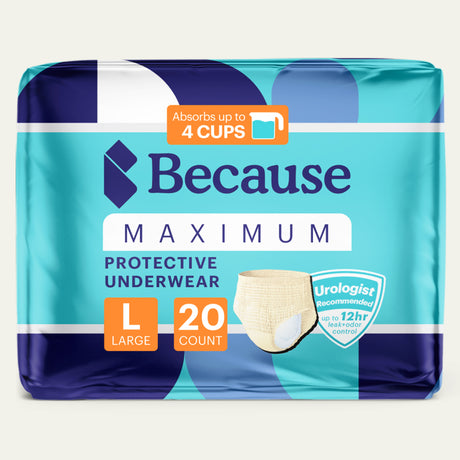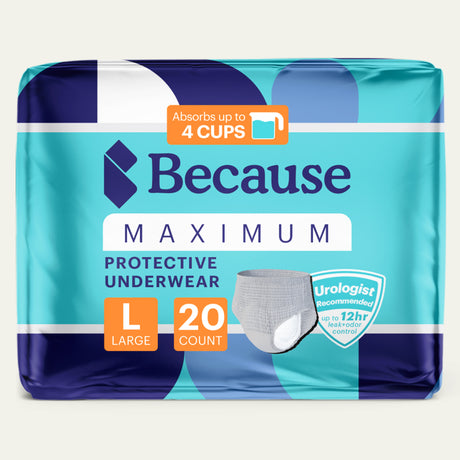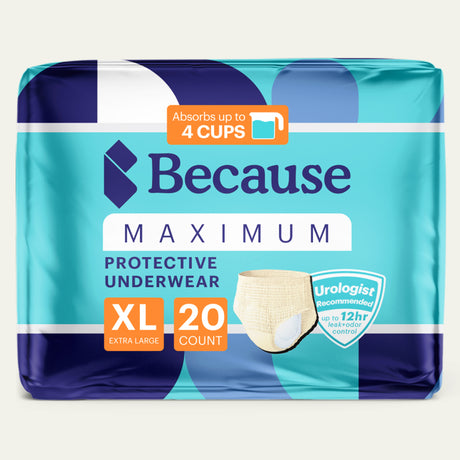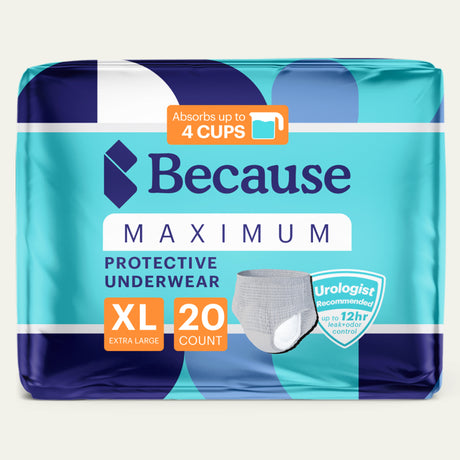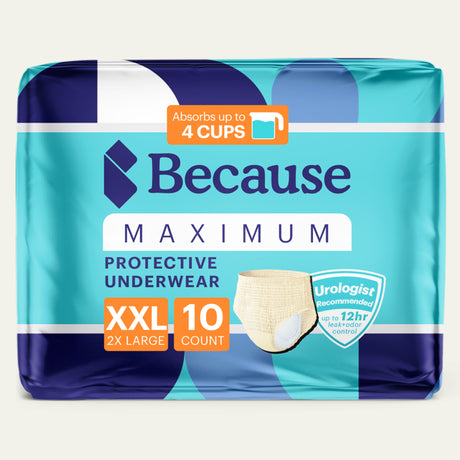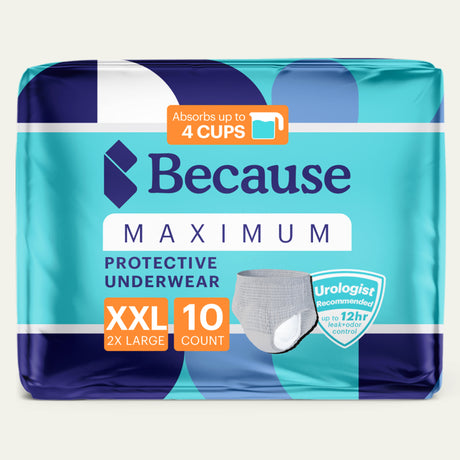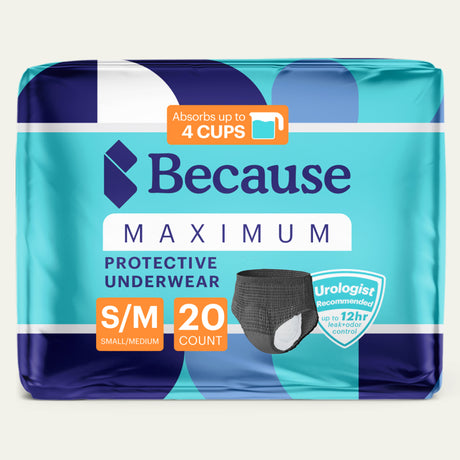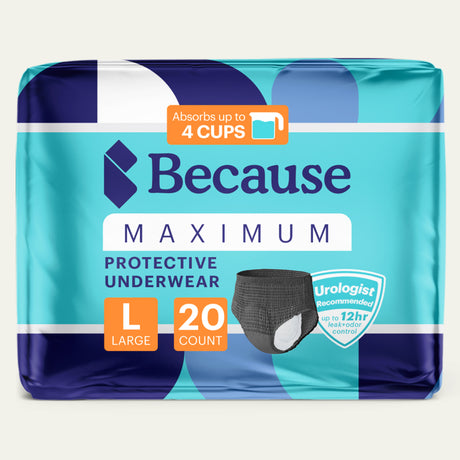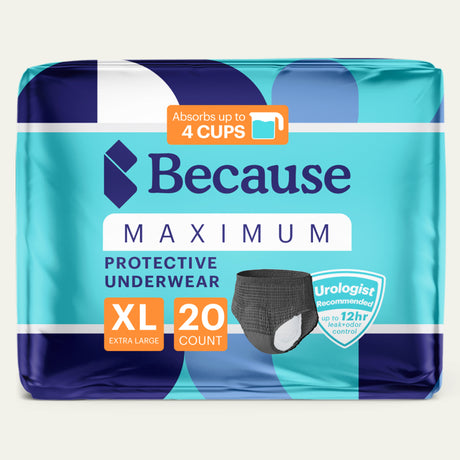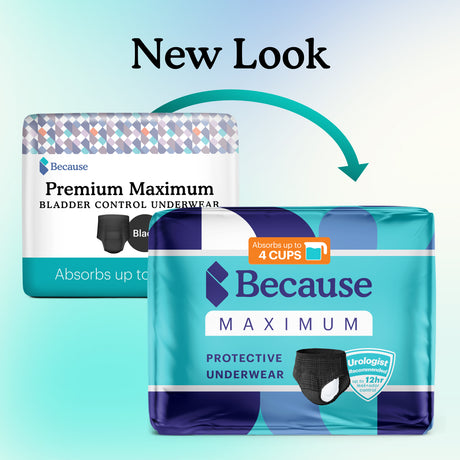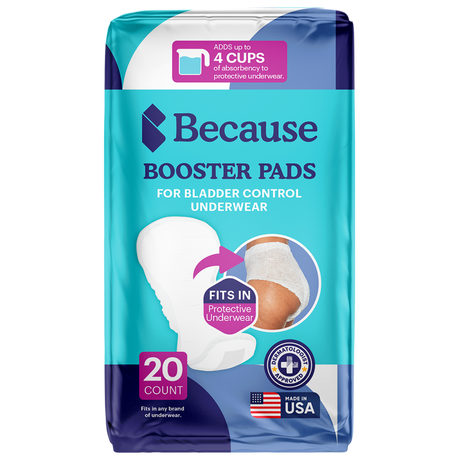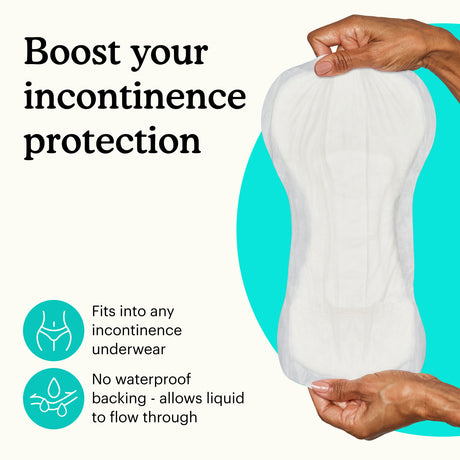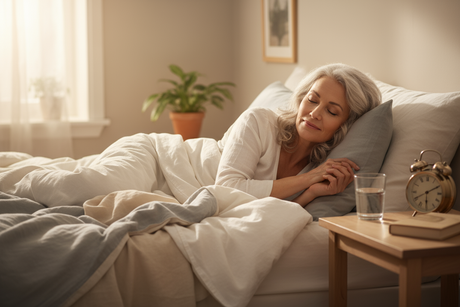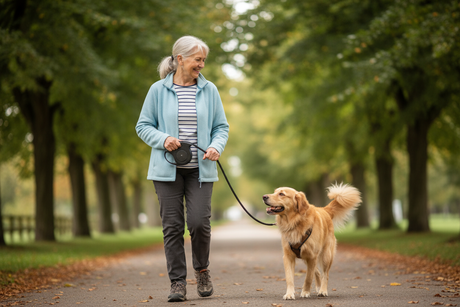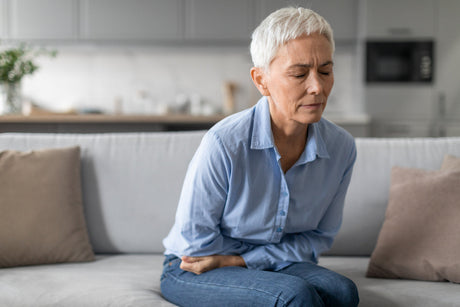Incontinence and constipation are two health issues that people often avoid talking about due to embarrassment and stigma, but the truth is that many people experience them. In fact, 16% of adults experience constipation at any given time, and more than 13 million people have urinary incontinence.
If you’re one of the many people with chronic constipation or incontinence, you may be surprised to know that the two problems could be connected. In this post, we’ll explore how your bowel movements might contribute to urinary incontinence.
Common Causes and Symptoms of Constipation
Typically, doctors diagnose a person with constipation if they have fewer than three bowel movements per week. Other symptoms of constipation include:
- Dry stools
- Lumpy stools
- Hard stools that are difficult to pass
- Pain when using the toilet for a bowel movement
- Persistent abdominal pain and cramps
- Feeling like you haven’t completely emptied your bowels after you go to the bathroom
Many things can cause constipation. The following are some of the most common causes.
Lifestyle
Dehydration can deprive your body of the fluid needed to produce stools with the right consistency. A diet low in fiber and/or rich in dairy products could also contribute to constipation. People who don’t get enough exercise may be more prone to the problem, but even things like resisting the urge to move your bowels when you need to could limit your ability to have regular bowel movements.
Medications
Many medications can slow down bowel motions or alter the consistency of stools, leading to bowel dysfunction and constipation. Some drugs and supplements known to cause constipation include:
- Opioid pain relievers like codeine and oxycodone
- Nonsteroidal anti-inflammatory drugs (NSAIDs) like naproxen and ibuprofen
- Some antidepressants like fluoxetine and amitriptyline
- Iron supplements
- Calcium and aluminum antacids
- Blood pressure medications like atenolol, nifedipine, and verapamil
- Mental health medications like olanzapine and clozapine
- Antiseizure medications like gabapentin and phenytoin
- Medications for nausea like ondansetron
- Allergy medications like diphenhydramine
If you’re taking a medication that causes constipation, your doctor may be able to prescribe an alternative that has less impact on bowel function.
Bowel Problems
Problems with your large intestine and digestive system can cause constipation. Issues with the longest section of the intestine, called the colon, and the last few inches of the organ, called the rectum, can lead to fewer bowel movements or make it more difficult to pass stool. Constipation is a common symptom of some digestive disorders like irritable bowel syndrome (IBS) and diverticular disease. It can also be a sign of colorectal cancer.
Other Medical Conditions
In some cases, constipation is a symptom of another medical condition, such as:
- Pregnancy
- Thyroid disease
- Diabetes
- Multiple sclerosis
- Parkinson’s disease
- Stroke
- Lupus
- Scleroderma
- Spinal cord injury
- Spina bifida
Some people may temporarily develop constipation after surgery or another medical procedure.
Chronic Idiopathic Constipation
In some cases, clinicians can’t determine the cause of chronic constipation. When this happens, medical professionals refer to the issue as chronic idiopathic constipation, a condition that can affect both adults and children. Stress, diet, and lifestyle may contribute to the condition, but more research is necessary to fully understand why it happens.

How Constipation and Urinary Incontinence Are Related
The association between constipation and incontinence is due to the way irregular bowel movements affect your bowel, bladder, and pelvic floor muscles. Let’s take a closer look at these effects.
Constipation and the Bowel
Your large intestine’s main job is to digest food, absorb nutrients, and release what remains as solid waste, known as feces or poop. When you become constipated, feces accumulate in the bowel, causing it to stretch. The organ is designed to stretch a little to help food and waste move, but constipation can cause the organ to become distended, meaning it swells outward.
Constipation and the Bladder
Your bowel and your bladder are neighbors in your pelvis. The bladder is the organ that stores urine produced by the kidneys until you pass it out of your body by urinating. When your bowel becomes distended due to constipation, the organ can put pressure on the bladder. As a result, your bladder may not be able to hold as much urine, and/or urine may not flow out of the bladder as easily when you relax your sphincter muscles to urinate.
Constipation and the Pelvic Floor
Your pelvic floor muscles are a group of muscles that support both your lower digestive system and your urinary system. Prostate problems in men or childbirth and hormonal changes in women can weaken the pelvic floor. When this happens, urine leakage may occur.
Bowel distension due to constipation can also negatively impact pelvic floor muscles. Swelling can exert pressure on the muscle group, straining and weakening it.
Can Constipation Cause Urinary Incontinence?
Constipation impacts your urinary system, and its effects can worsen some types of incontinence. People with stress incontinence may be more prone to urine leakage due to the effects of constipation on the pelvic floor. When pressure from an enlarged bowel due to incontinence makes it difficult for the bladder to empty, overflow incontinence may occur.
If you have an overactive bladder (OAB) or urge incontinence, the pressure exerted by built-up fecal matter could make urinary urgency more severe. Older people with these conditions who have difficulty getting to the bathroom quickly may be at an increased risk for accidents when constipated.
In most cases, constipation isn’t the direct cause of urinary incontinence. Instead, constipation combines with other factors to make urine leakage, loss of bladder control, and urinary urgency more likely to happen. However, severe constipation may occasionally be the sole cause of incontinence. Treating constipation will usually alleviate urinary incontinence symptoms if this is the case.
Since it’s more likely that incontinence has a different underlying cause, treating the conditions usually requires a combined approach. Doctors usually recommend a combination of interventions and lifestyle changes to address urinary incontinence and constipation.
It’s important to note that constipation can directly cause bowel incontinence. In fact, constipation is one of the leading causes of fecal incontinence. When feces accumulate in the lower section of the large intestine, it can form a blockage. Eventually, pressure may build up to the point that softer, more liquid stool gets forced out around the obstacle, which can lead to a loss of bowel control.
How Constipation Can Also Lead to Urinary Retention
In addition to potentially worsening incontinence, constipation can also cause urinary retention, a condition that happens when you’re unable to empty your bladder all the way when you urinate. If constipation persists for an extended period of time, the bowel may press against the bladder, trapping urine inside. This can lead to various lower urinary tract symptoms, such as feeling like your bladder is still full after urinating, pelvic pressure, and bladder leakage.
If you’re experiencing urinary retention due to constipation, seeking treatment from your healthcare provider is important. Untreated urinary retention can lead to recurrent urinary tract infections and damage to the urinary system.

Preventing and Treating Incontinence and Constipation
The right treatment for incontinence and constipation usually involves self-care, lifestyle changes, and medical interventions that address each condition. A treatment plan may include the following changes.
Dietary Changes
Being choosy about the foods you eat can improve both incontinence and constipation symptoms. Some foods and drinks are bladder irritants that worsen urinary symptoms, and cutting back on or avoiding them could help alleviate symptoms in those with incontinence. Alcohol, caffeine, spicy foods, and acidic foods are some foods you may want to eliminate from your diet or enjoy only occasionally.
Eating more fiber-rich foods like fruits, vegetables, whole grains, nuts, and legumes can help your body form and pass stool. Greasy, fatty foods like fast food, potato chips, whole-milk dairy products, processed foods, and red meats can also worsen constipation, so eating less of these things may help you have more regular bowel movements.
Drinking enough water and other fluids daily is essential for urinary incontinence and constipation. Your healthcare provider can advise you on how much water you should drink daily.
Supplements
In some cases, healthcare providers may recommend supplements for constipation and urinary incontinence. Fiber supplements can help those who struggle to consume enough fiber from diet alone, and pumpkin seed and soy germ may reduce urinary urgency and other incontinence symptoms.
Physical Exercise
Regular exercise is important to overall health. Getting enough physical activity each week can aid digestion and support bowel regularity. In addition, exercise combined with a healthy diet can help you reach or maintain a healthy weight. Weight management is important for those with urinary incontinence, as extra weight can increase pressure on the pelvic floor and bladder and contribute to symptoms like urinary urgency and leakage.
Exercises to Strengthen the Pelvic Floor
Like other muscles, the pelvic floor can be strengthened and toned through regular exercise. Performing Kegel exercises and other exercises that target the muscles in the lower pelvis may lessen the severity of incontinence symptoms and promote overall pelvic health in those who struggle with chronic constipation.
Medication
Depending on the cause of your symptoms, medication may be an effective treatment for constipation or urinary incontinence. Your healthcare provider may recommend taking over-the-counter laxatives to help you move your bowels more regularly. If an underlying condition is responsible for your constipation symptoms, the right medicines may help control the health issue and lower the likelihood of constipation reoccurring in the future. There are also medications approved for treating some types of urinary incontinence, such as OAB.

Using Bladder Protection Products for Peace of Mind
Worrying about whether constipation and incontinence will cause an embarrassing accident may lead you to avoid certain activities or change your routine. Using bladder protection products like pads and underwear can protect you against wetness by absorbing urine when you experience bladder leakage or a total loss of bladder control.
When to Seek Medical Help
If you’re experiencing new symptoms of constipation, see your medical provider to rule out any underlying medical issues. Even if you know the cause of your symptoms, talk to your doctor if constipation is causing urinary issues like urinary frequency and retention. Your medical provider can develop a treatment plan to address bladder-bowel dysfunction and give tips on how to promote regularity and reduce urine leakage.
Because Incontinence and Bladder Protection products can help you better manage problems with bowel and bladder function. Explore all the bladder protection options available to help you feel drier and more confident.
If you're struggling with incontinence, join one of our private support groups today!


